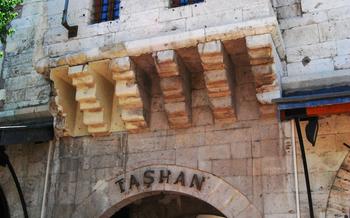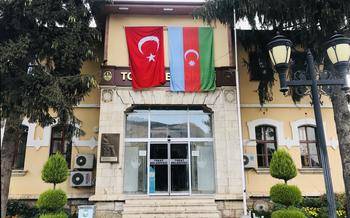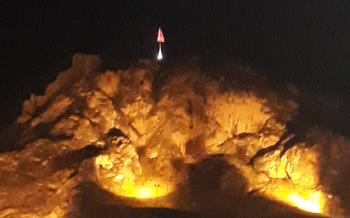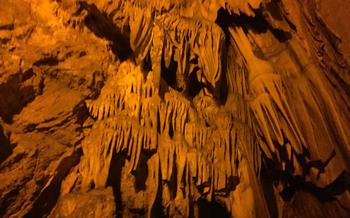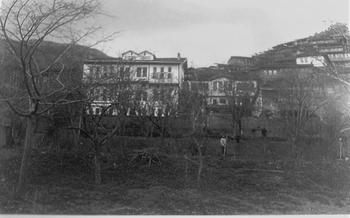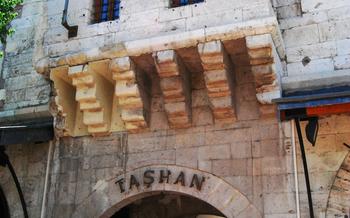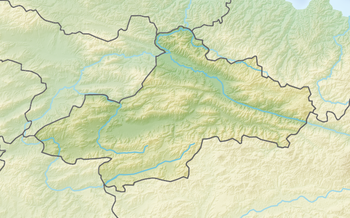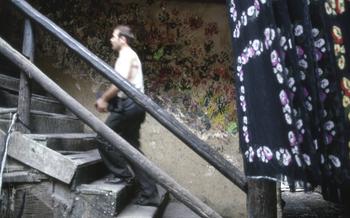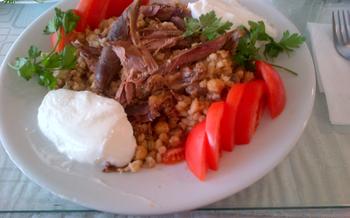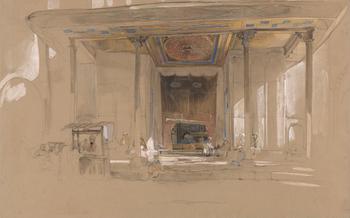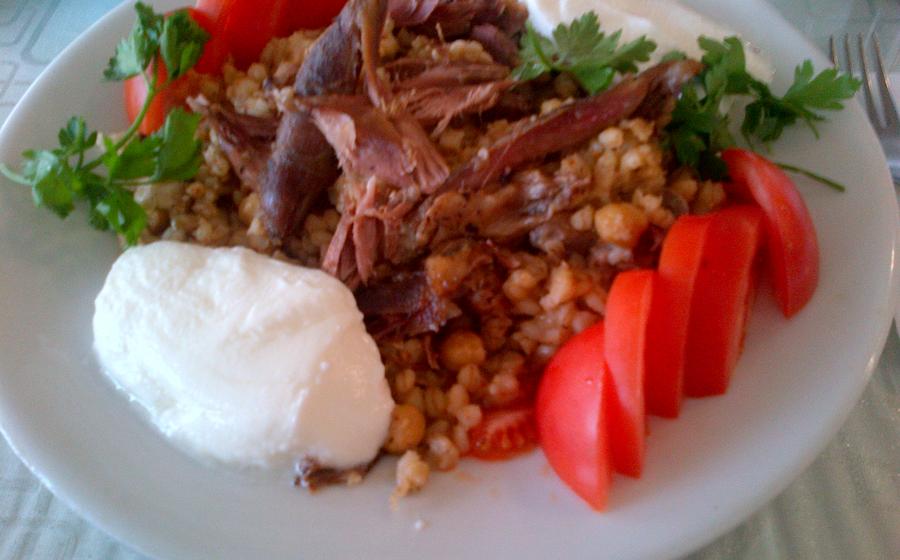
Arap Baba Tomb
- Historical Significance
- Visiting the Tomb
- Religious Significance
- Cultural Experience: A Tapestry of Traditions
- Nearby Attractions
- Local Cuisine: A Culinary Journey in Tokat
- Photography Tips: Capturing the Beauty of the Arap Baba Tomb
- Shopping
- Accommodation
- Transportation
- Safety Tips
- The Best Time to Visit
- Budget Tips
- Language and Communication
- Insider Tip: Participate in the Annual Tomb Festival
Historical Significance
The Arap Baba Tomb holds significant historical, religious, and cultural importance in Tokat, Turkey. Erected in the 13th century, the tomb is believed to be the resting place of Arap Baba, a revered Sufi saint who played a pivotal role in spreading Islam in the region. The architectural style of the tomb reflects Seljuk influences, featuring intricate carvings, calligraphy, and a domed roof. The tomb's unique design and historical associations make it a must-visit destination for those interested in exploring Turkey's rich cultural heritage.
Visiting the Tomb
To visit the Arap Baba Tomb, it is essential to dress respectfully, covering your shoulders and knees. The tomb is open to visitors daily, and there is a small entrance fee. Before entering the tomb, it is customary to remove your shoes and leave them outside. Inside the tomb, you can admire the intricate tilework and calligraphy that adorn the walls and ceiling. It is also common to make an offering, such as a small donation or a prayer, at the tomb.
The Arap Baba Tomb is not only a religious site but also a place of cultural significance. It is an important pilgrimage site for Muslims, especially Sufis, who come from all over Turkey and beyond to pay their respects to the saint. The tomb is also a popular tourist attraction, and visitors can learn about the history and culture of Tokat by visiting this sacred site.
Religious Significance
The Arap Baba Tomb holds immense religious significance for Muslims, especially Sufis. It is believed to be the resting place of the revered Sufi saint, Arap Baba, who is highly respected for his piety, wisdom, and spiritual teachings. The tomb serves as a pilgrimage site, attracting devout Muslims from across the country and beyond.
For Sufis, the tomb represents a physical connection to their spiritual lineage and a source of divine blessings. They often visit the tomb to pay their respects, seek guidance, and make offerings in the form of prayers, flowers, or donations. The tomb is also an important center for Sufi rituals and ceremonies, including zikir (remembrance of God) and whirling dervishes performances.
Beyond its significance for Sufis, the Arap Baba Tomb also promotes interfaith dialogue and understanding. It attracts visitors from various religious backgrounds who come to learn about the life and teachings of Arap Baba and to experience the rich spiritual atmosphere of the site. The tomb serves as a reminder of the common values of love, compassion, and tolerance that unite people of different faiths.
Cultural Experience: A Tapestry of Traditions
Visiting the Arap Baba Tomb is not just a spiritual journey but also a profound cultural experience. Immerse yourself in the local customs and traditions that have been shaped by centuries of devotion. Observe the pilgrims performing rituals, making offerings, and seeking blessings. Engage with the friendly locals, who are always eager to share stories and anecdotes about the tomb's significance. Learn about the unique customs associated with the tomb, such as the tradition of tying colorful ribbons to the surrounding trees as a symbol of wishes and prayers. The tomb's serene atmosphere and the devotion of its visitors create a palpable sense of spirituality and reverence. Embrace the opportunity to connect with the local community and gain insights into their beliefs and practices. As you wander through the tomb's grounds, let the rich tapestry of Turkish culture envelop you, leaving an indelible mark on your soul.
Nearby Attractions
Tokat offers a wealth of historical and natural attractions beyond the Arap Baba Tomb. Explore the impressive Tokat Castle, a 12th-century fortress perched atop a hill, providing panoramic city views. Immerse yourself in the Tokat Museum, showcasing the region's rich history and cultural heritage. Admire the intricate architecture of the Great Mosque, dating back to the 16th century, with its stunning dome and elegant minarets.
Venture into nature at the Tokat Canyon, a breathtaking gorge carved by the Yeşilırmak River. Hike along the canyon trails, marveling at the towering rock formations and lush vegetation. Take a refreshing dip in the cool waters of the Yeşilırmak River, a popular spot for swimming, fishing, and boating.
For a unique cultural experience, visit the Tokat Pazarı (Tokat Bazaar), a bustling marketplace where you can find an array of local products, handicrafts, and souvenirs. Engage with friendly vendors, savor the flavors of Turkish cuisine at local eateries, and soak up the vibrant atmosphere.
Local Cuisine: A Culinary Journey in Tokat
Tokat's culinary scene is a delightful blend of traditional Turkish flavors and regional specialties. As you explore the city, be sure to savor the local delicacies that reflect the rich cultural heritage of the region.
Must-Try Dishes:
-
Tokat Kebabı: Tender lamb cubes grilled on skewers and served with aromatic rice.
-
Sucuk: A spicy sausage made from beef or lamb, often enjoyed with eggs or grilled vegetables.
-
Katmer: A flaky pastry filled with cheese, meat, or vegetables, a local favorite for breakfast or lunch.
-
Yufka: A thin, unleavened bread used in various dishes, from wraps to gözleme (savory pancakes).
-
Tokat Köftesi: Juicy meatballs made with a blend of spices and herbs, served with rice or potatoes.
Turkish Coffee and Tea:
No visit to Turkey is complete without indulging in the local coffee and tea culture. In Tokat, you'll find cozy cafes and traditional teahouses where you can sip on a freshly brewed cup of Turkish coffee or çay (tea).
-
Turkish coffee is a strong, dark brew that is prepared in a special pot called a cezve. It's often served with a small glass of water and a piece of Turkish delight.
-
Turkish tea is a light, aromatic beverage made with black tea leaves and served in small tulip-shaped glasses. It's a popular accompaniment to meals and snacks.
Personal Experiences:
During my stay in Tokat, I had the chance to sample the local cuisine at a traditional Turkish restaurant. The Tokat kebabı was particularly memorable, with its tender lamb and flavorful rice. I also tried the katmer, which was a delicious and indulgent pastry.
As for Turkish coffee, I found it to be an acquired taste. It's much stronger than regular coffee, but it's a great way to experience the local culture. I enjoyed sipping on a cup of çay after meals, as it helped to cleanse my palate and aid digestion.
Photography Tips: Capturing the Beauty of the Arap Baba Tomb
The Arap Baba Tomb, with its intricate architecture and serene surroundings, offers ample opportunities for capturing stunning photographs. Here are some tips to help you make the most of your photography experience:
-
Golden Hour Magic: Plan your visit during the golden hours, just after sunrise or before sunset, to take advantage of the soft, warm light that beautifully illuminates the tomb and its surroundings.
-
Composition and Angles: Experiment with different angles and perspectives to create visually interesting shots. Try capturing the tomb from a low angle to emphasize its grandeur, or from a distance to include the surrounding landscape.
-
Details and Close-ups: Don't forget to capture the intricate details of the tomb's architecture, such as the carvings, inscriptions, and tilework. Close-up shots can add depth and character to your photographs.
-
Natural Framing: Utilize natural elements like trees, flowers, or archways to frame your shots and create a sense of depth and dimension.
-
Reflections and Symmetry: If there's a water body nearby, take advantage of reflections to create symmetrical and visually appealing compositions.
-
People and Pilgrimage: Capture the essence of the tomb as a pilgrimage site by photographing the devotees and pilgrims who visit the tomb, showing their reverence and devotion.
-
Explore the Surroundings: Don't limit yourself to the tomb itself. Explore the surrounding gardens, courtyards, and pathways to capture the serene atmosphere and the beauty of the natural surroundings.
Shopping
Tokat offers visitors a delightful shopping experience with vibrant local markets and unique handicrafts. The city is renowned for its exquisite carpets, handwoven with intricate designs and vibrant colors. Be sure to visit the local carpet shops and witness the artisans skillfully creating these masterpieces. Tokat is also known for its beautiful pottery, featuring a variety of glazed and unglazed ceramics. From decorative plates to intricate vases, you'll find a treasure trove of unique pieces to take home as souvenirs. Jewelry lovers will be delighted by the selection of handmade silver and gold jewelry, adorned with precious stones and intricate designs. Explore the local shops and discover the craftsmanship and artistry that make Tokat a shopper's paradise.
Accommodation
Tokat offers a range of accommodation options to suit different budgets and preferences. For a luxurious stay, consider the five-star Otel Tokat, which boasts elegant rooms, a spa, and panoramic city views. For a more affordable option, the three-star Hotel Demircioglu is a good choice, offering comfortable rooms and a central location. Backpackers and budget travelers will find several hostels and guesthouses in Tokat, such as the Tokat Hostel, which provides basic but clean accommodation.
When choosing accommodation, consider your proximity to the Arap Baba Tomb and other attractions you wish to visit. The city center is a convenient base, as it offers easy access to most landmarks. If you prefer a more tranquil setting, consider staying in one of the charming villages surrounding Tokat, such as Zile or Turhal. These villages offer a glimpse into traditional Turkish life and are a short drive from the city.
No matter your budget or preferences, you're sure to find suitable accommodation in Tokat. The city's friendly locals are always willing to help visitors find the perfect place to stay.
Transportation
Getting to Tokat is relatively easy, with several transportation options available. The city is well-connected by bus to major cities in Turkey, such as Ankara, Istanbul, and Izmir. The bus journey from Ankara takes approximately 6 hours, while from Istanbul it takes around 10 hours. Tokat is also accessible by train, with direct services from Ankara and Sivas. The train journey from Ankara takes about 5 hours. If traveling by air, the closest airport is Tokat Airport, which is located about 15 kilometers from the city center. From the airport, you can take a taxi or bus to your destination. Once in Tokat, getting around is easy with local transportation options such as taxis, buses, and rental cars. Taxis are readily available and affordable, while buses cover most areas of the city. If you prefer to explore at your own pace, renting a car is a good option, with several rental agencies located in the city center.
Safety Tips
Tokat is generally considered a safe city for travelers, but as with any destination, it's important to take basic safety precautions. Be aware of your surroundings, especially when visiting crowded areas like the Arap Baba Tomb. Keep your valuables secure and avoid carrying large amounts of cash.
If you're traveling alone, be cautious when accepting offers of help from strangers. Stick to well-lit areas at night and avoid walking alone in isolated places. Learn a few basic Turkish phrases to help you communicate with locals and navigate the city more easily.
In case of an emergency, dial 112 for the police, fire department, or ambulance. There are several hospitals in Tokat that provide medical care, including the Tokat State Hospital. The Turkish people are known for their hospitality, so don't hesitate to ask for help if you need it.
The Best Time to Visit
Timing your visit to Tokat and the Arap Baba Tomb is crucial to ensure a memorable experience. The best time to visit is during spring (April-May) or autumn (September-October) when the weather is pleasant, with warm days and cool nights. The mild climate during these seasons makes it ideal for exploring the tomb's surroundings and engaging in outdoor activities.
Summer (June-August) can be hot and crowded, especially during the peak tourist season. If you prefer to avoid the heat and crowds, plan your visit during the shoulder months, when the weather is still favorable, and you'll have a more intimate experience.
Winter (November-March) brings cold weather and occasional snowfall, making it less ideal for outdoor exploration. However, if you're looking for a serene and contemplative atmosphere, visiting during this time can offer a unique perspective on the tomb and its surroundings.
Additionally, consider the significance of specific seasons or festivals related to the tomb. For example, the annual Arap Baba Festival is held in August, attracting numerous pilgrims and visitors. This festival offers a vibrant cultural experience and an opportunity to immerse yourself in local traditions.
Budget Tips
Visiting Tokat on a budget is not only possible but also incredibly rewarding. Here are a few tips to help you stretch your travel budget:
-
Accommodation: Opt for budget-friendly options like hostels, guesthouses, or family-run pensions. These offer comfortable accommodations at a fraction of the cost of hotels.
-
Food: Take advantage of Tokat's street food scene. From delicious kebabs to fresh gözleme, there are plenty of affordable options to satisfy your taste buds. Local markets are also a great place to find fresh produce and ingredients at reasonable prices.
-
Transportation: Utilize public transportation to get around the city. Buses and taxis are generally inexpensive and widely available. Consider renting a bicycle for a more active and economical way to explore.
-
Free Activities: Many attractions in Tokat, including the Arap Baba Tomb, are free to visit. Take advantage of free walking tours, visit local museums on free admission days, or simply wander the charming streets and soak in the city's atmosphere.
-
Cook Local: Instead of dining out every night, purchase groceries from local markets and cook your own meals. This can save you a significant amount of money while allowing you to experience the local cuisine like a local.
Language and Communication
Turkish is the main language used in Tokat, and English proficiency among locals varies. It is helpful to learn basic Turkish phrases like "hello," "thank you," and "goodbye" to show respect and make interactions easier. Many younger people and those in the tourism sector may speak some English, but it's always beneficial to come prepared with a translation app or phrasebook. Body language and gestures can also be effective communication tools when words fail. Remember to be patient and understanding, as not everyone may be fluent in English. Embrace the opportunity to immerse yourself in the local culture and language, and don't be afraid to ask for help if needed. Locals are generally friendly and welcoming and will assist you in any way they can.
Insider Tip: Participate in the Annual Tomb Festival
For an immersive experience, time your visit to Tokat with the annual Arap Baba Tomb Festival. Held every September, this vibrant festival celebrates the life and legacy of the revered Sufi saint. Join thousands of pilgrims and locals as they gather for prayers, Sufi whirling ceremonies, and traditional Turkish music performances. Witness the tomb adorned with colorful decorations and partake in the communal feast, where you can savor delicious local cuisine and connect with the warm-hearted community. This festival is a testament to the enduring spiritual significance of the Arap Baba Tomb and offers a unique opportunity to delve into the rich cultural traditions of Tokat.
